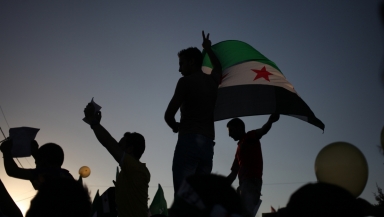
An Armenian Syrian pastor, whose family is from Kessab, close to Syria's northern border with Turkey, has reported that they have fled the village after Syrian rebel jihadists took control of the area.
The fighting in the predominantly Armenian Christian town started Friday March 21st. World Watch Monitor has seen a letter in which he said fighters of the Al-Nusra front and ISIS (Islamic State of Iraq and Sham - greater Syria) entered North West Syria from Turkey and progressively took control over the town the same day.
Kessab is about 10Km from the Mediterranean, and the most northern Syrian town near the coast.
The Armenian pastor writes that the day after the Al Qaeda-linked fighters took control, most of the town's population (some 650 families, over 3000 individuals), fled into the hills or had taken refuge in the coastal city of Latakia, about 50km south of Kessab. Nothing has been heard since from those who remained to guard family properties.
Armenian media sources have claimed 80 Armenians were killed in the assault. The pastor wrote: "In taking over control, churches were desecrated, houses pillaged and government buildings destroyed."
He writes that many internally displaced Syrians had already taken refuge in the Kessab area, since it is located in the Alawite-dominated region of Latakia, which has been relatively calm over the past three years.
Sources who contacted the Religious Liberty Commission of the World Evangelical Alliance say the Syrian Army launched a counter offensive on Saturday 22 March. The RLC's report reads: "On Sunday 23 March jihadist reinforcements arrived. The remaining Armenians were taken hostage as homes were looted and churches desecrated. That afternoon, Turkish fighter jets shot down a Syrian Air Force MIG-23 jet that was assisting SAA ground forces in repelling the jihadists".
According to Turkey, the MIG-23 was 1.2km inside Turkish airspace, but Syria denies this.
The Syrian Observatory for Human Rights - a UK-based activist group - said initial reports from the area suggested the plane came down on the Syrian side of the border.
The downing of the Syrian Airforce plane has been interpreted by local Armenians as complicity by Turkey in the Islamist rebels' advance, stirring as it does memories of the Armenian genocide by Turkey a hundred years ago. Indeed, the pastor wrote: "it not only reminds us (of this), this is the continuation of the previous genocide."
However the Turkish Prime Minister Tayip Erdogan said "A Syrian plane violated our airspace. Our F-16s took off and hit this plane. Why? because if you violate my airspace, our slap after this will be hard."
The BBC's James Reynolds says that Turkey has broadly sided with the rebels since their war started in October 2011: Turkey shares an 800 Kilometres-long border with Syria.
Today, Thursday 27th March, Turkey has blocked access to YouTube after a video was posted there, apparently showing members of its government discussing military tactics linked to the war in Syria.













